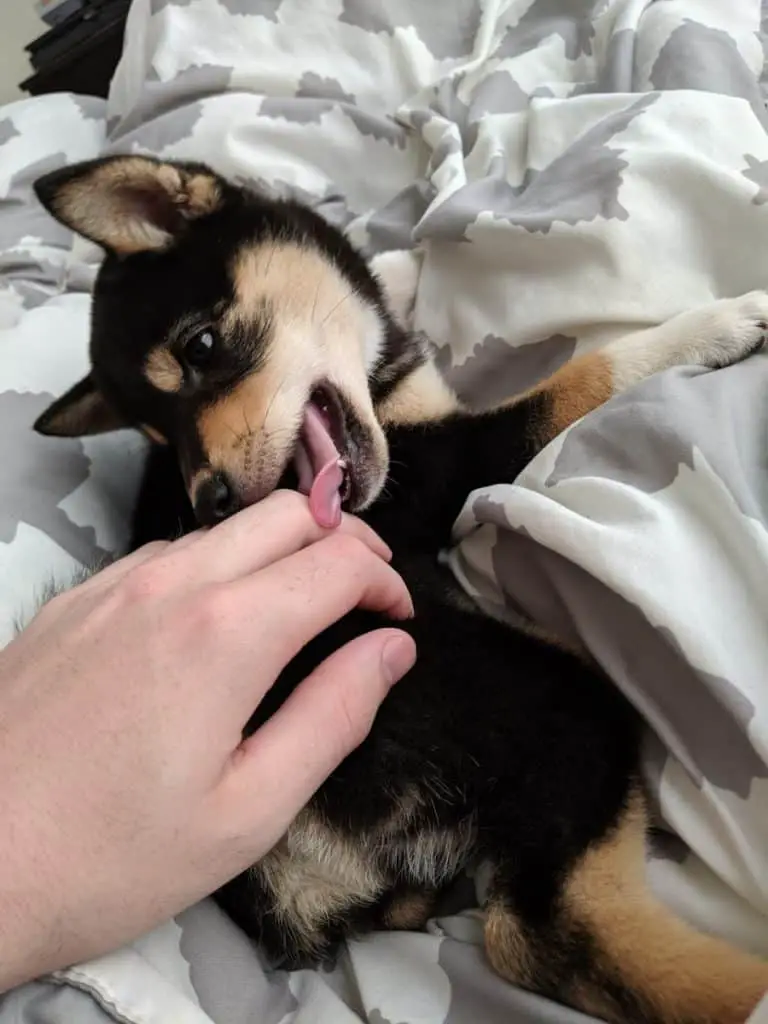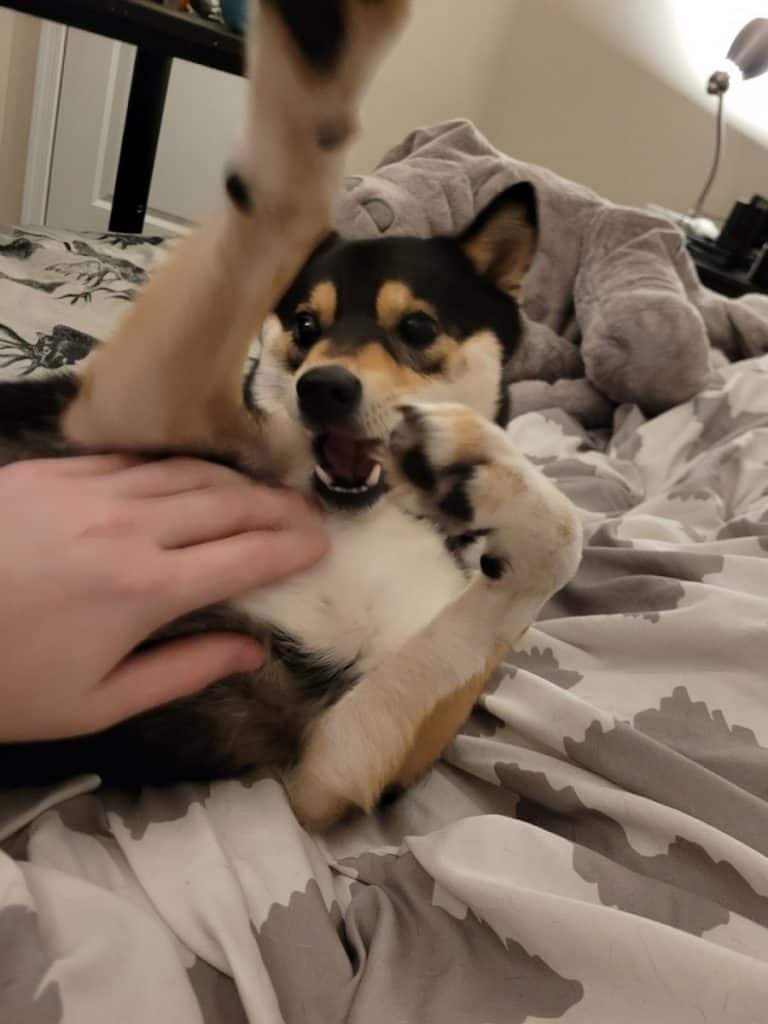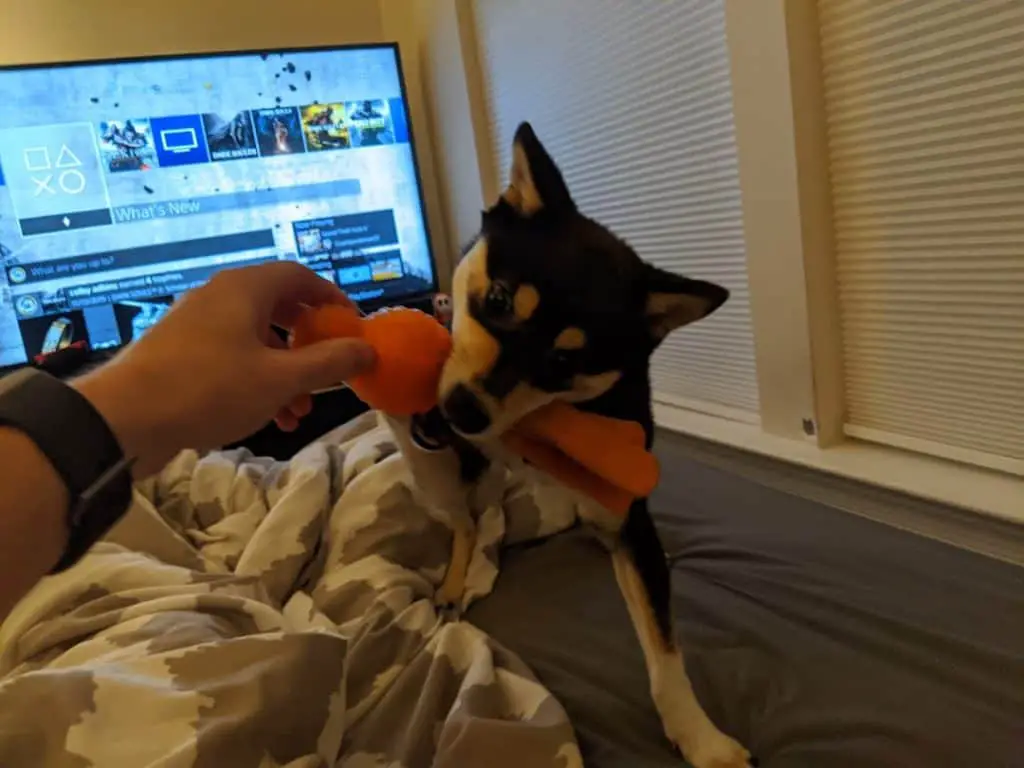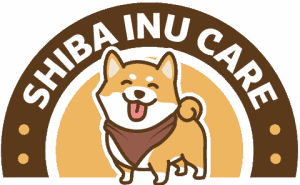This post contains affiliate links.
Biting, nipping, and constant mouthing was a real struggle for me while raising Faith. Thankfully as she grew up and I learned more about her I started to figure out how to manage it.
Shiba Inus interact with the world around them primarily with their mouths, making biting common. Most biting and mouthing aren’t malicious. Shiba Inus commonly bite when they want to play or get your attention. Standing up and ignoring them for a few seconds tells them biting isn’t acceptable.

After several weeks of research, testing, and teeth marks I was finally able to curve Faith’s bad biting habit. Here is what I learned and how I went about it
Reasons For Doggy Biting
Dogs do things for a reason, and a chaotic Shiba Inu is no different. With pet’s there is always a root cause leading to the effect you are dealing with, in this case, it’s biting.
There is no one-size-fits-all reason your Shiba is biting, but there are a couple of smaller possible causes:
Aggression
Animal aggression can start at any age and should immediately be your first priority to curve and manage (more on this below).
Attention Seeking Behavior
Your attention is precious for every dog, especially Shiba Inus. Shibas thrive on attention and will actively seek it out when bored, barking and biting being the easiest ways to get it.
Handling
Nipping and biting while being handled is common, but can be annoying. Getting your dog, especially at a young age, used to being pet, picked up, leashed, paws cleaned, and so on is important.
Instinct
Shibas are a mouthy, clever, and stubborn breed. Making socializing and bite inhibit training them more of a focus compared to other breeds.
Over Excitement
Whether greeting someone new or seeing you get home from work, excitement is a common and natural reaction for any pet.
Play
They may just be in a playful mood but need to know they won’t get what they want through biting.
Poor Social Skills
Shibas learn how to bite and how to control their bite strength from their parents and siblings at a very young age. It’s possible your puppy missed some crucial lessons while growing up.
Stress
Fear, anxiety, and a lack of social skills or experience are overwhelming for dogs. All of which can lead to excess biting, barking, and potentially aggression.
Teething
They are transitioning from puppy to adult teeth, usually around the 4-9 month mark, they use biting to smooth the discomfort.
While not an exhaustive list it’s a great place to start. Take some time and notes of when your Shiba Inu starts biting and write down what you think is causing it. Hopefully, it isn’t aggressive, but just in case, let’s quickly go over that possibility.
How To Handle Aggressive Biting
Aggression, as a puppy or adult, isn’t acceptable and they need to know that. The vast majority of biting, at any age, is due to a want to play or interact with you.
Some signs your dog’s biting may be aggressive are:
– Lips curling
– Showing teeth
– Growling
– Ears are pulled back
– Stiff body language
If you notice any of these you should take a step back and take note of what’s going on.
Did I hurt them?
Are they guarding a toy?
Are they guarding treats?
Do they think I’m invading their space?
Are great starting questions to ask yourself. We have a post going over Shiba Inu aggression if you believe that’s the case.
Some Things To Avoid

Knowing what not to do is just as important as knowing what you’re supposed to do. Most people don’t realize they are actually provoking their Shiba into biting them, especially while they are young. Some common ones are:
- Waving your fingers in front of them, they look like a toy and incentivize biting.
- Laying with them while playing puts you on their level, making them more likely to bite your nose and lips.
- Encouraging the behavior, your attention is addicting. They’ll continue to misbehave if it consistently gets it.
A few other things to avoid are jerking motions and physical punishment.
Jerking your hand or foot away after being bit comes across as playing in a dog’s eyes. It could also turn that bite into a scratch if you aren’t careful.
Slapping, aggressive grabbing, harsh jerking, kicking, and other forms of physical punishment are both abusive and sour your pet’s relationship with you. Hitting is a form of negative reinforcement which is both ineffective and causes your Shiba to become aggressive and fearful towards you.
If continued that fear and aggression towards you will extend to other people around you, including strangers.
Shiba Inus thrive on positive reinforcement like treats and praise. Positive reinforcements are more effective, easier for your pet to understand, and help build your guy’s relationship instead of tearing it down.
Let’s go over some ways to properly handle biting behaviors.
How To Handle Non-Stop Biting
Your Shiba Inu’s age and personality play a big part in how long this behavior correction may take.
If they’re a puppy and you start while they are young this may take as little as a few weeks to around a month. Where if you start when they are an adult this could take several months.
The reason for that is we are tackling both a bad behavior and a bad habit. It’s easier to manage harsh nipping and biting when they are young and still growing. Where an older pet, much like a person, maybe stuck in their own habits and routines.
Before starting anything there are a few things you should know and do beforehand.
1) This is a slow and sometimes tedious process, there is no quick fix or one-time solution
2) If you live with family, friends, or roommates they need to be on the same page as you. Everybody needs to help, rule inconsistencies extend the timeline and confuse your Shiba.
3) While some puppies will grow out of biting not all will, it’s best to be safe and assume your Shiba won’t simply “grow out of it”.
After that, the best two ways to manage this unwanted behavior are with bite inhibition training and redirection.
Bite Inhibition Training
Bite inhibition is all about teaching your pet when, where, and how hard they should bite. This is commonly used by their parents while they are puppies.
We as people have thinner more sensitive skin than dogs do, but they don’t know or understand that.
Our goal here is to bring biting frequency down to a minimum, it’s impossible to completely stop it, with the lightest force possible.
The reason you can’t entirely stop biting is dogs u
se their mouths for everything. From grooming, chewing, handling, grabbing, loving, and so on. A Shiba’s mouth is their most valuable tool when it comes to interacting with the world and people around them.
It’s best to start this kind of training while they’re young due to biting force. A puppy’s teeth may be sharper than an adult’s but they can’t chomp down on your fingers nearly as hard.
A fantastic way to perform bite inhibition training is with hand feeding.
Feeding your puppy their food by hand, even if it’s only some, makes them play by your rules and it’s easy to do.
1) Grab a handful of kibble from their bowl and get their attention with it.
2) Slowly let them lick and eat some of the kibble out of your hand.
3) If they bite say “ouch” in a sharp quick tone and turn away from them for 5-10 seconds.
4) Once the time is up and they have calmed down return to hand feeding them.
You want to repeat this every day during each meal for the first month or two. This simple form of training has many benefits.
– Reduce biting
– Helps you bond with your pup
– Helps prevent food aggression
– Helps prevent resource guarding
Puppies learn how to bite, play, and socialize with their parents and siblings. Their best way of saying that hurt is with a sharp “cry” or “yelp”. We want to use an “ouch” or “yelp” because it’s quick and easy for them to understand.
“No” works just fine for an adult Shiba Inu, by then they properly understand what you mean when you use it, which is “stop what you are doing”.
Redirection
Ultimately we want to redirect our Shiba Inu’s bad biting habits towards something we are ok with them gnawing on, like a bone or chew toy.
The great thing about redirection is its flexibility.
We can use anything we want and at any age, but this isn’t a miracle cure for biting or other bad habits. Time, consistency, patience, and a calm level head are the backbone of any real training or behavioral correction session.
Yelling, hitting, or locking your Shiba away doesn’t help solve the problem or teach them anything, they’ll only be confused.
The way I was able to get Faith to stop bitting my fingers while we played when she was a puppy was:
1) say “ouch”.
2) Calmly and gently remove my hand from her mouth.
3) Bring a nearby toy between and shake it, getting her attention.
4) Repeat if she nips my hand again.
If she continued to bite me I would say “ouch”, stand up, cross my arms, and turn my back to her for 10-15 seconds. Shiba’s love attention, especially when they are young, and usually understand what happened.
But if she continued to bite or even escalate her behavior (jumping up my leg or biting my clothes) I would calmly yet firmly say “no” and leave the room. This completely withdrawals my attention from her. I would return anywhere from 30 seconds to 2 minutes later, whenever she was calm and quiet for a couple of seconds.
Two other things I did to discourage her “love of biting me instead of her toys I spent all my money on” we a gentle “jaw lock” and the “claw hand” technique
Jaw Lock
This sounds scary but it’s completely safe, I just couldn’t think of a more fitting name, here’s what it is:
1) When a finger or hand was in her mouth I’d roll it upwards, so my palm was toward the ceiling.
2) Gently rest a finger on the roof of her mouth and apply very light pressure.
3) Warp the rest of my fingers gently around her snout and hold.
Usually, she’d being to tug and try to step backward, which I’d then let her go. This worked wonders for me but may not work for everybody. You can also go for their lower jaw instead of their upper jaw, whichever is easier for you. Either jaw works.
Claw Hand Technique
Again, this sounds a bit scary, but it isn’t.
1) When bitten say “no”.
2) Gently pull my hand or finger out of her mouth.
3) Calmly but firmly grab the back of her neck (the scruff) as if my fingers were teeth.
4) Push them down flat against the floor, you want to be firm but you aren’t trying to hurt them.
5) Hold them down for 5-10 seconds, then let go.
I would use this method if she was getting really out of hand.
Redirection And Prevention Methods

Each Shiba Inu and situation is unique, take time to understand your specific case. Different root causes of excessive biting may require a certain kind of response in return.
Here are some common biting situations and solutions I’ve had results with:
Attention Seeking Behavior
Boredom and excess energy tend to drive Shiba Inus to do one of two things, bark or bite. Both of which can turn into a nasty habit if left alone.
Faith loves to nip at my ankles as I walked by without interacting with her, usually because I’m busy cleaning or on the phone. It was an easy thing for her to do and it use to always get my attention.
Wrapping whatever I was doing up, waiting for her to calm down, then starting a several-minute play session always did the trick for us. How you play is important when managing a nippy pup.
Non-contact forms of play like fetch or tug-of-war is a great way to relieve their boredom and help them burn any extra energy they have, tug being our favorite (more on proper play below).
Over time while playing tug-of-way Faith would slowly work her way up the rope to my fingers. A sharp “no” followed by taking the rope and turning around for 10 seconds worked. This pulls your attention away from them, which they want, and gives them a moment to calm down.
You can always substate playing with a quick walk or jog.
Excitement
Having friends or family over to hang out or meet your new four-legged family member can be a blast, but managing Faith’s excitement was not easy.
Before people even got inside she would start screaming, clawing at, and jumping up and down at the front door. The moment they got inside she would dial it up to 11 and go into overdrive.
Over-excitement can be incredibly frustrating because there’s nothing inherently wrong with getting excited, but there is a limit.
Ignoring your Shiba Inu when you get home, or having your guest do so until they calm down usually does the trick. It pulls the attention they want away from them so you don’t accidentally reward the bad behavior. Quietly turning away from them without eye contact if they start to jump.
Once they begin to calm do it’s safe to slowly start giving them attention, but if they get too worked up go back to ignoring them.
We have some more information on managing over-excitement in Shiba Inus here.
Handling
Nipping, biting, and mouthing are common while handling any pet. A Shiba’s mouth is their most valuable tool when it comes to interacting with the people and world around them.
Faith loved to gnaw on my fingers whenever I was petting, scratching, or holding her.
I ended up noticing she would flip out whenever I touched her ears or tail, resulting in a barrage of bites and teeth.
Bouncing between the “jaw lock” and “claw hand” techniques resulted in her calming down. I would then slowly get her use to being touched and messed with by rewarding calm behavior with treats.
- She let me touch her ear, treat.
- She let me touch her tail, treat.
- She let me play with her tail, treat.
- She let me touch her paws, treat.
She only got a treat if she was calm and didn’t bite. If she started to nip I would pull my attention, I would start using one of the techniques listed above if it started to escalate.
Shiba Inus are a “basal” breed meaning they have been around longer than more modern breeds like Chihuahuas and Russell Terriers.
Meaning they aren’t used to being handled like modern breeds. Paws, ears, tail, nail trimmings, and brushing are all important forms of touch and handling you want to take time making sure your Shiba Inu is comfortable with.
Poor Social Skills
It’s possible your pet’s excess biting could be caused by a lack of social skills and understanding. They may not know biting isn’t good manners.
Shiba Inus are very aloof, leading to fear and aggression when left unsocialized.
Faith loved being mouthy while meeting other people and pets. Frequent walks, while others are out with their pets, are a fantastic way to help your puppy get a lot of social experience quickly. Hiking is another great option.
Most people out walking their pets are friendly animals lovers, don’t be afraid to ask if your pets could meet. Just let them know you are working on their social skills if your Shiba is particularly nippy.
Rough Play
Play is all fun and good until it starts to turn aggressive and get out of hand.
Nips while playing is completely normal, accidents happen, but if your Shiba Inu purposely going for your hands or feet it’s time to take a step back.
Rough or even aggressive play at a young age can quickly spiral out of control or become dangerous when they grow up. Do your best not to reward rough play by disengaging from the play session and ignore them until they calm down.
If it’s non-aggressive and purely good sport, but not what you want, be sure to shift their attention from you to a chew toy. Praise and reward them for playing with the toy and when they play with you gently.
You can also use non-contact forms of play like fetch or tug-of-war to put some distance between you and your puppy’s chompers.
When To Seek Professional Help
If it seems like nothing you read, watch, or try is working it may be time to get professional help.
Obedience training is helpful for more than just biting, and if you need help managing your Shiba’s biting there are usually other problems.
Look for reputable local classes in your area with positive reviews and an active community, like a forum or Facebook page. If you are struggling to find one ask your vet, they are around pets and pet-based situations all the time, they may have some helpful recommendations for you. Online classes are another option if you don’t have any good local options.
Frequently Asked Questions
How Do I Get My Shiba Inu To Stop Biting?
To prevent your Shiba Inu from biting, interrupt the behavior with a loud noise or “No.” Redirect their energy with a chew toy or treat. Teach bite inhibition by yelping when they bite too hard. Consistent training is key.
Why Does My Shiba Inu Bite Me So Much?
There are a few reasons why a Shiba Inu might bite you:
- Teething: When Shiba Inu puppies are teething, they may chew on objects or nip at your hands or feet to relieve their discomfort.
- Play: Shiba Inus are very active and might accidentally bite you during playtime without realizing that they’re hurting you.
- Fear or stress: If your Shiba Inu feels threatened or stressed, they may bite as a way to defend themselves.
Are Shiba Inus Prone To Biting?
Shiba Inus are not inherently prone to biting. However, they are an intelligent and independent breed that requires consistent training, socialization, and positive reinforcement to prevent unwanted behaviors. Biting can develop if a Shiba Inu is not properly trained or socialized.
Why Is My Shiba So Aggressive?
Shiba Inus may exhibit aggressive behavior due to lack of socialization, territorial instincts, or pain/discomfort. Consult a professional for tailored training or treatment.
